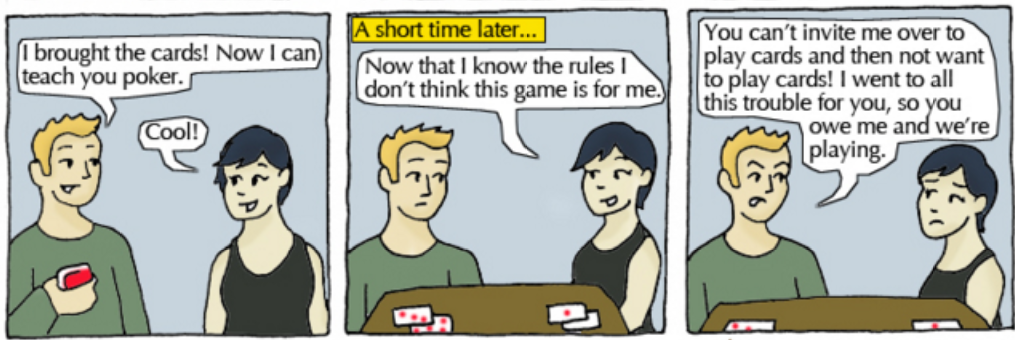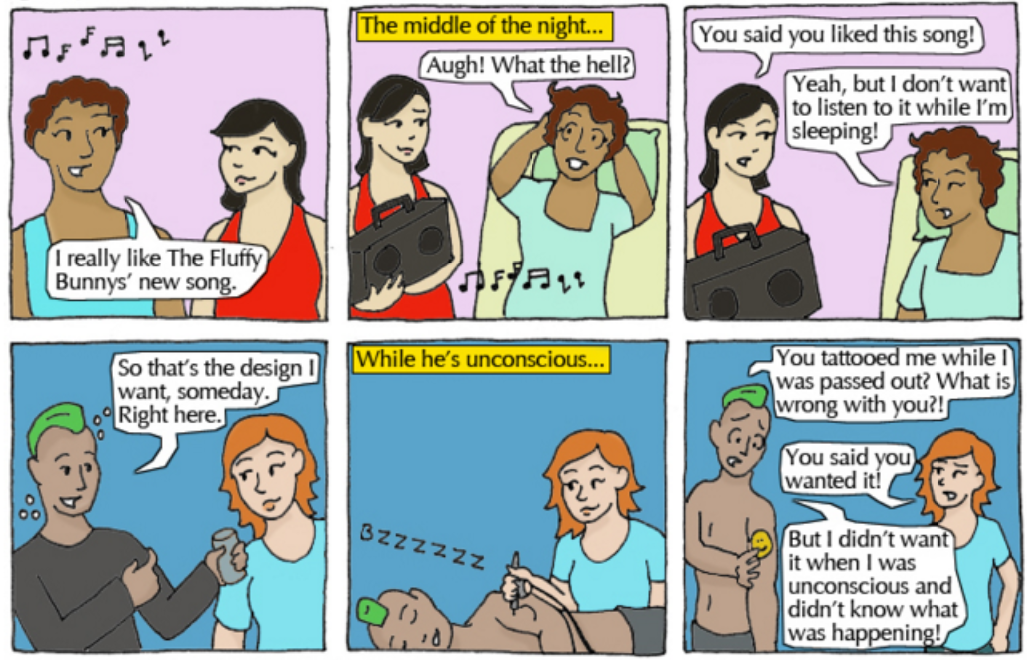These Cartoons Nail Society's Problem With Sexual Consent

By:
There's a real problem in how we talk about consent in the context of rape and sexual assault.
Too often people blame the victim and question whether they brought on the situation with their words or actions. Were they dressed provocatively? Were they drunk? Didn't they agree to go out on the date? If the answer is yes to any of these, then somehow this serves as grounds for consent. But as many victims of sexual assault and rape have explained, there is no logical situation or explanation for what happens in an attack—sexual assault is never okay.
In most situations, society understands consent. But when it comes to sex, for some reason things can get a little hazy. To demonstrate this, Everyday Feminism's cartoonist Alli Kirkham drew a series of cartoons showing people in everyday situations using the same excuses people might say to rationalize sexual assault.
Related: This Brave Woman Shared Her Chilling Story Moments After She Got Raped
In the cartoon below, a man agrees to watch a movie with his friend but suddenly changes his mind; however, this doesn't stop his friend from forcing him to watch it.
 Alli Kirkham/Everyday Feminism - everydayfeminism.com
Alli Kirkham/Everyday Feminism - everydayfeminism.com
In another illustration, a woman agrees to let her male friend borrow her car. He does but shows up the next week to take it without permission.
 Alli Kirkham/Everyday Feminism - everydayfeminism.com
Alli Kirkham/Everyday Feminism - everydayfeminism.com
When you check out these scenarios, the concept of consent becomes crystal clear. You would never let someone take your car without your permission or without your knowledge. Yet, the justification of "agree once, agree forever" happens all the time in cases of sexual attack, and it's often the victim that gets blamed.
In an interview with i100 Kirkham explained:
"I wanted to make it obvious that there's a huge double standard about how we as a culture handle consent and engage in victim blaming. It's sad to me that there are still so many people who don't understand consent but I think that's changing - we're starting to see more discussion of affirmative consent and more attempts to stop victim blaming, and that's really recent, which is why it's important to keep educating people about what isn't OK when it comes to consent."
 Alli Kirkham/Everyday Feminism - everydayfeminism.com
Alli Kirkham/Everyday Feminism - everydayfeminism.com
Redefining consent is happening slowly but surely. Several states have passed affirmative consent laws in an effort to curb sexual assault on college campuses. At its core, affirmative consent requires college students to secure a clear and consensual "yes" before engaging in sexual activity, making consent affirmative, conscious and voluntary. But as Think Progress points out, that is not normally the case in sexual encounters. "The current societal script on sex assumes that passivity and silence—essentially, the “lack of a no”—mean it’s okay to proceed." The "no means no" standard leaves a lot room for subjective interpretation of consent and places a lot of the burden on the victim to resist. In essence, if a victim doesn't outright protest, then essentially he or she is offering consent.
Related: Councilwoman Destroys CNN Anchor for Rape-Victim Shaming
Victim blaming is a huge part of rape culture, which focuses on the victims and not the attackers. According to the Daily Mail, one in four people believe that drunk rape victims are "a little bit responsible" for their fate and one in 12 people think that flirtatious and drunk women should shoulder some of the blame for sexual assaults. Although sexual assault is a criminal offense, it's clear that a part of society believes it is permissible when victims puts themselves in a "compromising situation."
 Alli Kirkham/Everyday Feminism - everydayfeminism.com
Alli Kirkham/Everyday Feminism - everydayfeminism.com
But regardless of the situation, consent must be clear. As the campaign #ConsentIsEverything says, sex without consent is rape. Kirkham's cartoons illustrate that outside of sexual intercourse, we wouldn't let certain behaviors fly just because of past promises or treat people a certain way because of how they are dressed or what they say—it seems ludicrous to do so. Yet these are rationalizations used in the context of rape and sexual assault far too often. As the narrative of these situations balances out, and more attention is placed upon the attacker, the definition of consent should become more obvious.
You can see Kirkham's other cartoons below:
 Alli Kirkham/Everyday Feminism - everydayfeminism.com
Alli Kirkham/Everyday Feminism - everydayfeminism.com
